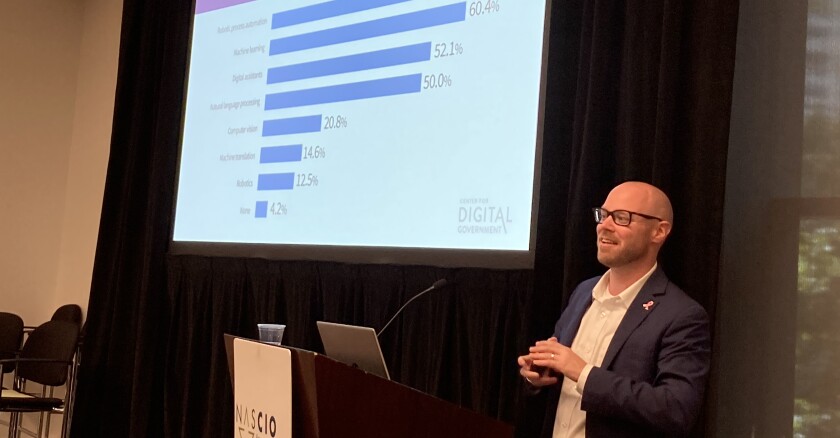At the NASCIO Annual conference in Seattle this week, Joe Morris with CDG presented some of the study’s 2021 findings, and it was clear that the COVID-19 pandemic changed how state and local government are thinking about AI. This year, 60 percent of respondents reported AI is currently in use in their enterprise; 6.7 percent said the tech is widely used across the state, up from just 1 percent in 2019.
The shift seems to have come in part from the spike in demand for government services in 2020 when the pandemic hit and states scrambled to find new ways to meet the high volume of citizen needs. AI-powered chatbots were the answer to fielding requests of overwhelmed call centers across the country, a finding the CDG survey confirmed: 60.4 percent of state respondents in 2021 reported used AI for digital assistants in the past 12 months. Other leading uses were robotic process automation (47.9 percent) and natural language processing (37.5 percent).
Much of the concern around adopting AI and machine learning in government has come down to staffing issues. Nearly 80 percent of surveyed states reported a lack of skilled staff trained in AI as a bottleneck to the technology’s adoption. But of course there are also more traditional worries about robots replacing jobs and making human labor obsolete.
In an interview with GovTech, Nevada CIO Alan Cunningham was clear that the purpose of introducing AI to government is not to replace staff, but free up their ability to do harder work, to take away what he called “the drudgery,” or what Morris described as “the burden of rote work.”
Cunningham is enthusiastic about AI adoption in government, although he is quick to note that he prefers to refer to it as "machine learning." He sees the tech as a tool to actually make it easier for people to interact with technology, so people can spend more energy doing what they’re good at.
Complete findings from the 2021 AI survey from CDG, NASCIO and IBM are forthcoming.
*The Center for Digital Government is part of e.Republic, Government Technology’s parent company.
















